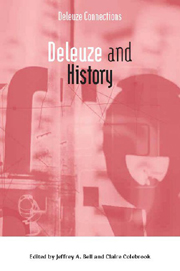Book contents
- Frontmatter
- Contents
- Introduction
- 1 Events, Becoming and History
- 2 Of the Rise and Progress of Philosophical Concepts: Deleuze's Humean Historiography
- 3 Theory of Delay in Balibar, Freud and Deleuze: Décalage, Nachträglichkeit, Retard
- 4 Geohistory and Hydro-Bio-Politics
- 5 The Thought of History in Benjamin and Deleuze
- 6 The Cannibal Within: White Men and the Embodiment of Evolutionary Time
- 7 Ageing, Perpetual Perishing and the Event as Pure Novelty: Péguy, Whitehead and Deleuze on Time and History
- 8 Cinema, Chronos/Cronos: Becoming an Accomplice to the Impasse of History
- 9 Deleuze's Untimely: Uses and Abuses in the Appropriation of Nietzsche
- 10 Is Anti-Oedipus a May '68 book?
- 11 Molar Entities and Molecular Populations in Human History
- Notes on Contributors
- Index
5 - The Thought of History in Benjamin and Deleuze
Published online by Cambridge University Press: 12 September 2012
- Frontmatter
- Contents
- Introduction
- 1 Events, Becoming and History
- 2 Of the Rise and Progress of Philosophical Concepts: Deleuze's Humean Historiography
- 3 Theory of Delay in Balibar, Freud and Deleuze: Décalage, Nachträglichkeit, Retard
- 4 Geohistory and Hydro-Bio-Politics
- 5 The Thought of History in Benjamin and Deleuze
- 6 The Cannibal Within: White Men and the Embodiment of Evolutionary Time
- 7 Ageing, Perpetual Perishing and the Event as Pure Novelty: Péguy, Whitehead and Deleuze on Time and History
- 8 Cinema, Chronos/Cronos: Becoming an Accomplice to the Impasse of History
- 9 Deleuze's Untimely: Uses and Abuses in the Appropriation of Nietzsche
- 10 Is Anti-Oedipus a May '68 book?
- 11 Molar Entities and Molecular Populations in Human History
- Notes on Contributors
- Index
Summary
Regarding a Reading
The sentences fromthe final chapter of Le Pli in which Deleuze briefly cites Walter Benjamin's Ursprung des Deutschen Trauerspiels (1925) are far from straightforward. And yet these comments nonetheless deserve close attention since the very complexity of their reflection adduces the conditions bywhich the philosophical significance of the baroque – a significance that informs each of these arcane studies – might be explored. In keeping with the declaredly monadological propaedeutics with which Benjamin prefaces his study, the opacity of Deleuze's patient (even meditative) consideration of the earlier work exhibits both thinkers’ understanding that, for a baroque synthesis of things, no thesis suffices to be conceptualised categorically but rather is informed by the peculiarly historical analysis which emerges in regard to a written work's before and after.
At the outset of his section on ‘The World as a Cone: Allegory, Emblem and Device’, Deleuze declares that
Walter Benjamin made a decisive step forward in our understanding of the Baroque when he showed that allegory was not a failed symbol, or an abstract personification, but a power [puissance] of figuration entirely different from that of the symbol: the latter combines the eternal and the momentary, nearly at the centre of the world, but allegory uncovers nature and history according to the order of time, it produces a history from nature and transforms history into nature in a world that no longer has its centre.
(Deleuze 1993: 125; 1988: 170–1)- Type
- Chapter
- Information
- Deleuze and History , pp. 103 - 120Publisher: Edinburgh University PressPrint publication year: 2009

